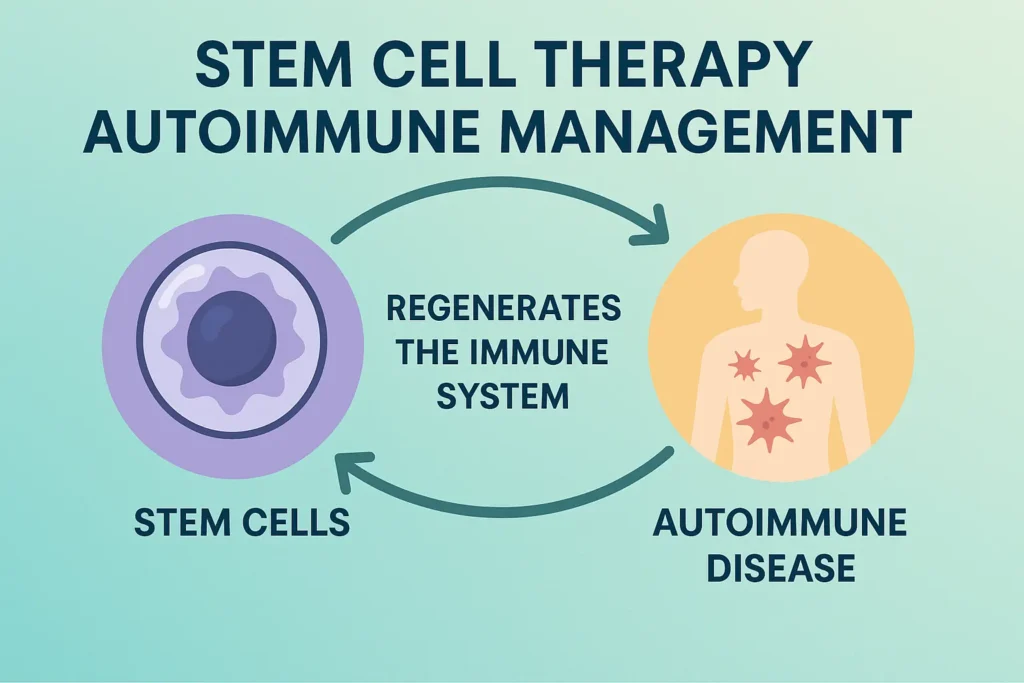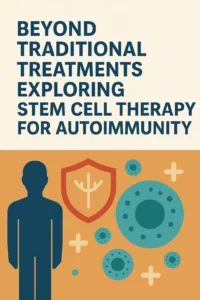Stem Cell Therapy Autoimmune Management: A Hopeful Path to Regeneration
For millions living with chronic autoimmune diseases, managing daily symptoms can feel like a relentless cycle. If you’re searching for long-term solutions that go beyond symptom control, stem cell therapy autoimmune management offers an exciting and hopeful frontier.
This breakthrough in regenerative medicine is not only being explored for its potential to relieve symptoms, but also for its power to retrain or rebuild the immune system itself. In this article, we’ll unpack how stem cells may help in improving autoimmune symptoms, and why many experts believe this could be the future of autoimmune care.
Understanding Stem Cells for Autoimmune Disease Relief
Stem cells are the body’s master repair cells capable of transforming into specialized cells and helping repair or regenerate damaged tissues. In autoimmune diseases, the body’s immune system mistakenly attacks healthy tissues, causing chronic inflammation and lasting damage.
Stem cells for autoimmune disease relief work by:
- Reducing inflammation
- Repairing damaged tissue
- Rebalancing immune system activity
The goal? A healthier, more tolerant immune system and relief from long-term autoimmune symptoms.
What Is Stem Cell Therapy Autoimmune Management?
When we talk about stem cell therapy autoimmune management, we’re referring to a treatment strategy that uses stem cells to both manage symptoms and target the underlying immune dysfunction.
The therapy often involves:
- Harvesting Stem Cells: Usually from the patient’s bone marrow or fat tissue.
- Purifying and Expanding the Cells: In a lab, stem cells are isolated and multiplied.
- Infusing Them Into the Body: After immunosuppression (if required), the new cells are introduced to help reset immune functions.
Unlike daily medication that manages symptoms short-term, stem cell therapy seeks to alter the immune system’s response, potentially reducing dependency on drugs over time.
Regenerative Medicine: Autoimmune Treatment Beyond Symptoms
Regenerative medicine autoimmune treatment is not a miracle cure but it’s a radical shift from treating symptoms to potentially repairing the root cause of disease.
Benefits may include:
- Longer remission periods
- Reduced disease flares
- Decreased reliance on immunosuppressants
- Better quality of life
Ongoing studies in Multiple Sclerosis, Lupus, Crohn’s Disease, and Rheumatoid Arthritis are showing that stem cells may help modulate immune responses and reduce organ or tissue damage over the long term.
Improving Autoimmune Symptoms with Stem Cells: What the Research Says
Clinical trials and real-world applications are offering promising insights:
- Multiple Sclerosis: Patients treated with hematopoietic stem cells experienced reduced relapses and even signs of neurological repair.
- Systemic Lupus: Some individuals have achieved complete remission following stem cell transplant.
- Rheumatoid Arthritis: Mesenchymal stem cells may reduce joint inflammation and slow progression.
The promise of improving autoimmune symptoms with stem cells lies in how these treatments reduce autoimmunity while regenerating affected tissues.
Who Could Benefit from Stem Cell Therapy Autoimmune Management?
Stem cell therapy isn’t for everyone, but those who might benefit include:
- Patients with severe, treatment-resistant autoimmune diseases
- Individuals experiencing rapid disease progression
- Those seeking alternatives to lifelong immunosuppression
If you’re someone living with a chronic autoimmune condition and conventional treatment isn’t working, exploring stem cell therapy might offer a new direction filled with possibility.
Risks, Limitations & Considerations
As with all advanced therapies, it’s essential to approach stem cell treatment with informed caution:
- Not yet FDA-approved for most autoimmune uses (though widely studied)
- Expensive and not always covered by insurance
- Risks related to chemotherapy or cell rejection
- Long-term effects still being studied
However, the field is advancing rapidly, with more clinical trials, safety data, and global treatment centers emerging every year.
Taking the First Step: Is Stem Cell Therapy Right for You?
Here’s what to consider:
- Consult a specialist in autoimmune or regenerative medicine
- Review clinical trials on platforms like ClinicalTrials.gov
- Seek accredited stem cell centers
- Discuss your medical history, goals, and financial options
Hope starts with information. And informed decisions can lead to life-changing outcomes.
Conclusion: A Regenerative Future for Autoimmune Disease Management
Stem cell therapy autoimmune management represents more than a new treatment it signals a shift in how we think about chronic disease. From symptom control to immune system regeneration, the potential is real, and the science is catching up quickly.
If you’re seeking stem cells for autoimmune disease relief, there’s never been a better time to stay informed, ask your doctor, and explore what regenerative medicine might hold for your future.





